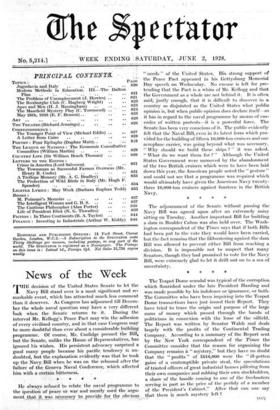He always refused to relate the naval programme to the
queStion of peace -Or war and -merely used the aigti;. ment that it was necessary to provide for the obvious P.R11VVIPAL CONTENTS. - - ,, "needs" of the United States. His strong support of PAGE -• '• the Peace Pact appeared in his Gettysburg Memorial Jugoilavia anditaly ' .. .. - _ .. ' • • 820 Day speech on Wednesday. No excuse is left for pre- Modern- -Methods in Education. III.—The -.Dalton - tending that the Pact is a whim of Mr. Kellogg and that 821 ' the Government as a whole arc not behind it. It is often 821 823 said, justly enough, that it is difficult to discover, in a 823 country so disjointed as the United States what public 825 opinion is, but when public opinion does declare itself—as 826 it has in regard to the naval programme by means of cas- 826 cades of written protests—it is a powerful force. The Senate has been very conscious of it. The public evidently felt that the Naval Bill, even in its latest form which pro- - vided for the building of fifteen 10,000-ton cruisers and one aeroplane carrier, was going beyond what was necessary. 829 " Why should we build these ships ? " it was asked. 880 " What do we want them for ? " Although the United 831 States Government were unmoved by the abandonment of the two British cruisers which were to have been laid 831 down this year, the American people noted the " gesture " 833 and could not see that a programme was required which 834 would ultimately have given the American Navy twenty- 835 three 10,000-ton cruisers against fourteen in the British Navy.






































